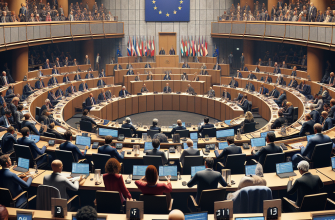<h1>Tensions Continue Between Poland, Hungary, and the EU Over Rule of Law</h1>
<p>Druz' my, let’s take a whimsical ride through the convoluted maze of politics where Poland and Hungary are doing a merry dance of defiance against the mighty European Union. This isn’t just a slight spat over rules and regulations; it's a deep-seated wrestling match over the very essence of democratic values that the EU holds dear. Buckle up as we explore these historical undertones, contemporary dynamics, and the imminent implications lurking beneath the surface.</p>
<h2>Historical Context and the EU's Mechanisms</h2>
<h3>The Article 7 Proceedings - A Play in the EU Theatre</h3>
<p>Hold on tight! Back in December 2017, the EU decided to push the big red button on Poland by triggering <a href="https://en.wikipedia.org/wiki/Article_7_of_the_Treaty_on_European_Union">Article 7</a> proceedings. Why? Well, this decision was rooted in concerns over the Law and Justice party (PiS) and their audacious reforms, which were like a bull in a china shop when it came to the judiciary. It was a blatant risk to fundamental principles: the rule of law, human rights, and, oh, the freedom of the press.</p>
<p>But Poland wasn’t walking this lonely road alone. Hungary joined the fray back in 2018, also facing <a href="https://en.wikipedia.org/wiki/Article_7_of_the_Treaty_on_European_Union">Article 7</a> scrutiny, highlighting their own descent into what critics termed “democratic backsliding”.</p>
<h3>The EU's Rule of Law Mechanism</h3>
<p>Let’s break this down for clarity, shall we? Article 7 of the EU Treaty is like the guardian of core values within the EU bubble, ensuring that every member state plays fair by respecting democracy, liberty, and human rights. If things go haywire, the European Commission tips its hat for a little chinwag with the state in question, followed by recommendations that are akin to gentle nudges. But if it gets too hairy? The EU membership rights can face suspension—though it takes a unanimous shout-out from other member states.</p>
<h2>Recent Developments in Poland</h2>
<h3>A New Government on the Horizon</h3>
<p>Zooming ahead to December 2023, a brand-new coalition, friendlier towards the EU, took the reins in Poland, with the ever-charismatic Donald Tusk at the helm. In February 2024, this refreshing coalition put forth an <a href="https://ec.europa.eu/info/index_en">action plan</a> to the European Commission, promising to restore the rule of law. Legal reforms were on the table—in theory, at least—aimed at addressing the EU’s prior concerns.</p>
<h3>The EU’s Big Decision</h3>
<p>After dissecting Poland’s proposal, the European Commission announced, to the surprise of many, that Poland was no longer flirting with serious breaches of the rule of law. Thus, they proposed to wrap up the Article 7 proceedings against Poland, a move that enjoyed the backing of most EU states, with Hungary, of course, trailing behind in stark opposition.</p>
<h2>Hungarian Opposition and Its Critiques</h2>
<h3>The Orbán Challenge</h3>
<p>And here comes Hungary, strutting in like an indignant peacock. Prime Minister Viktor Orbán, that seasoned political player, stood firm in opposition to the EU’s decision regarding Poland, framing it as an example of political manipulation from the ivory towers of Brussels. According to Hungary’s EU Affairs Minister, János Bóka, the EU was wielding rule-of-law concerns like a sword of Damocles, a tool for political blackmail!</p>
<h3>Critics Sound the Alarm</h3>
<p>But wait, there’s more! Critics—yes, those pesky watchdogs—have voiced discontent, particularly Human Rights Watch, cautioning that the EU’s decision to put a period at the end of the Article 7 proceedings in Poland was jumping the gun. Concrete reforms? They’re hardly twinkling in the distance, and key issues still need addressing. This raises eyebrows regarding the credibility of the entire Article 7 saga and concerns about a potential favoritism issue at play.</p>
<h2>Ongoing Challenges and Implications</h2>
<h3>Implementing the Reform Agenda</h3>
<p>Now let’s tiptoe back to Poland. Justice Minister Adam Bodnar has thrown a little cold water on the excitement, acknowledging that implementing this ambitious action plan will take a hot minute—several months, in fact! Full completion? Not likely until 2025, which just happens to be when President Andrzej Duda, the veto-wielding maestro, will be saying farewell.</p>
<h3>Repercussions for Hungary</h3>
<p>Hungary isn’t exempt from a potential backlash. The EU’s decision to wave goodbye to proceedings against Poland might embolden the Hungarian government, giving them fodder to undermine the Article 7 mechanism and scoff at the EU’s scrutiny of their own rule-of-law woes.</p>
<h3>The Broader EU Picture</h3>
<p>Lastly, I hear the whispers of a greater truth behind these unfolding dramas. The EU’s clumsy handling of rule-of-law issues in both Poland and Hungary showcases a glaring need for a stronger mechanism to ensure that all member states play by the rules. Current methods? They are showing their Achilles' heel, as calls for a comprehensive conditionality mechanism grow louder. This would allow the withholding of funds whenever any member state drops the ball on democratic principles and the rule of law.</p>
<h2>Conclusion</h2>
<p>So, what’s the takeaway from this whirlwind tour of tensions between Poland, Hungary, and the proverbial EU bigwigs? The power struggle over the rule of law reflects deeper, more profound challenges to maintaining democratic standards across the collective European Union. Recent developments in Poland paint a cautiously optimistic picture, but the road ahead is winding and fraught with complexities. Rest assured, ongoing monitoring and ironclad mechanisms are absolutely essential to safeguarding the EU’s foundational values.</p>
<h2>Key Points to Ponder</h2>
<ul>
<li><b>Poland's Action Plan:</b> The new Polish government has laid down an action plan promising to restore the rule of law, a step that has whetted the EU's appetite to end Article 7 proceedings.</li>
<li><b>Hungarian Opposition:</b> Hungary stands firm in opposition to the EU's actions, portraying them as mere political maneuvers.</li>
<li><b>Ongoing Reforms:</b> Implementation of the promised reforms will take time, with full adoption likely stretching into late 2025.</li>
<li><b>Broader Implications:</b> The EU must tighten its grip over compliance with its values, inventing a robust mechanism to ensure that no one dodges accountability.</li>
<li><b>Criticism and Concerns:</b> Prematurely ending proceedings may set a precarious precedent, raising major red flags.</li>
</ul>









